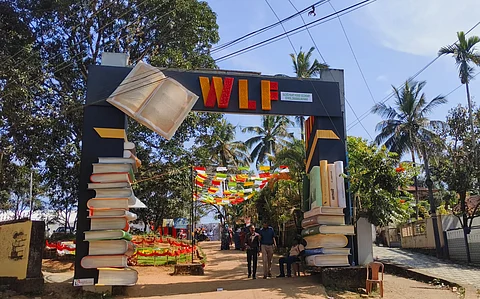

At around 7 pm on December 27, the chill of Wayanad was biting, but not unbearable. A fire had been lit in an open space on the sprawling Sacred Heart Higher Secondary School campus, with people gathered around it, engrossed in listening to their favourite authors read their own works. The panel featured famed Malayalam authors such as the legendary M Mukundan, NS Madhavan, PK Parakkadavu, and S Hareesh.
The biennial Wayanad Literature Festival (WLF), which began on December 26 and will run through December 29, is taking place in Mananthavady’s Dwaraka this year, bringing together delegates, speakers, and locals to celebrate literature and culture, while also raising awareness about climate change, ecology, and livelihood rights. A grand arch made of book models marked the entrance of the festival, showcasing works of a variety of authors. These include P Valsala’s Nellu and Anand’s Marubhoomikal Undakunnathu Engane, setting the tone for what is clearly a celebration of literature.
The organisers of the WLF proudly call it the largest rurally-held literature festival in the country, featuring more than 250 speakers from various fields. “It is organised in a panchayat, not even in a Taluk headquarters. Of course, we face logistical challenges, but the merit of the festival—and the space it creates for the mixing of ideas, energy, craft, excitement, and everything that is beautiful in village life—makes it second to none, particularly when compared to city festivals,” festival director Vinod K Jose said in a statement.
In addition to literary events, the festival also features farmer’s markets, film festivals, international academic conferences, arts and crafts fairs, and book fairs.
Climate change, a major concern
Five months since the devastating landslides struck Wayanad, the WLF seems to recognise the importance of addressing climate change. The International Academic Conference began with the topic ‘Climate Change and Wayanad: Reducing the Risks of Recurring National Disasters Through Scientific Understanding of the Landscape and Climate.’
Dr Manoj P Samuel, executive director at the Centre for Water Resources Development and Management (CWRDM) in Kozhikode, opened the session by discussing recent shifts in Kerala’s rainfall patterns. He explained that while the total amount of rainfall the state receives has remained consistent, the distribution over time has changed significantly. He pointed out that over recent years, the state has experienced more intense rainfall over short periods, which has contributed to tragic incidents like the Wayanad landslides.
Dr CR Rajendran, Earth Scientist and Adjunct Professor at the National Institute of Advanced Studies in Bengaluru, spoke about the geological and climate factors behind landslides in the Western Ghats. Dr A Abhilash, Director of the Advanced Radar Research Centre at Cochin University of Science and Technology (CUSAT), highlighted the importance of early warning systems in mitigating natural disasters like landslides and flooding, emphasising how much it can reduce the hazard.
Farmers, films, and more
One of the festival’s highlights was the session ‘Decoding the Captain of the Farmer’s Protest’, a lively conversation with Sukhdev Singh Kokri, general secretary of the Bharatiya Kisan Union (Ekta). Sukhdev Singh had led the farmers in Delhi during their protest against the Union government's proposed changes to farm laws. The session was moderated by Vinod K Jose and translated by Daljith Ami. During the conversation, Sukhdev Singh spoke about the deep bond among farmers in the Bharatiya Kisan Union and their decision to take their protest to Delhi. He spoke about the preparations they made, noting that they hadn’t anticipated the media support, especially given that much of the media is controlled by corporate interests. However, some independent media outlets did lend their support to the farmers’ cause, further emphasising that farmers have historically secured their rights through protests and struggles, rather than directly from the government.
The WLF also celebrated the rich tribal culture of Wayanad, which is home to an 18.5% tribal population. Poets who write in tribal languages form an integral part of Malayalam literature. One session, ‘Tribal Trails in Poetry’, featured poets such as Sukumaran Chaligatha, Dhanya Vengacheri, P Shivalingan, Ajayan Madoor, Bindu Irulam, Shanti Panakkan, Prakash Chenthalam, Sindhu Manganiyan, and Lijina Kadumeni. The session was moderated by scholar Dr Narayan Shankaran. Additionally, the festival showcased Paniya Nritham, a traditional dance performed by the Paniya tribe, a group native to Wayanad.